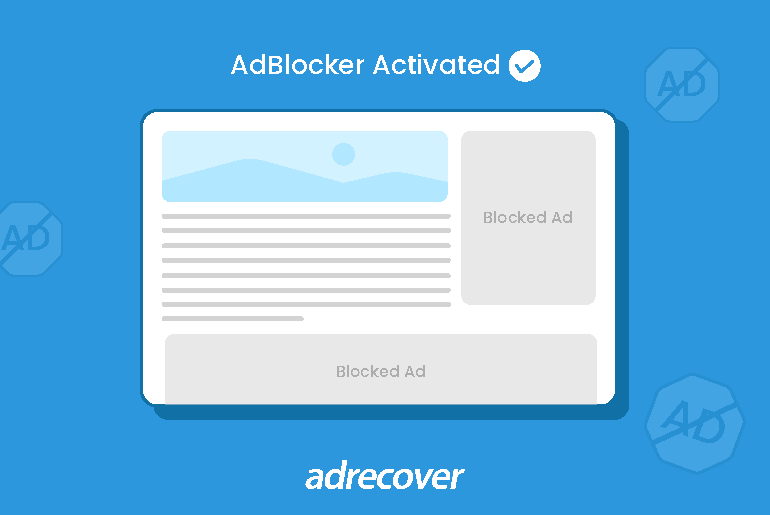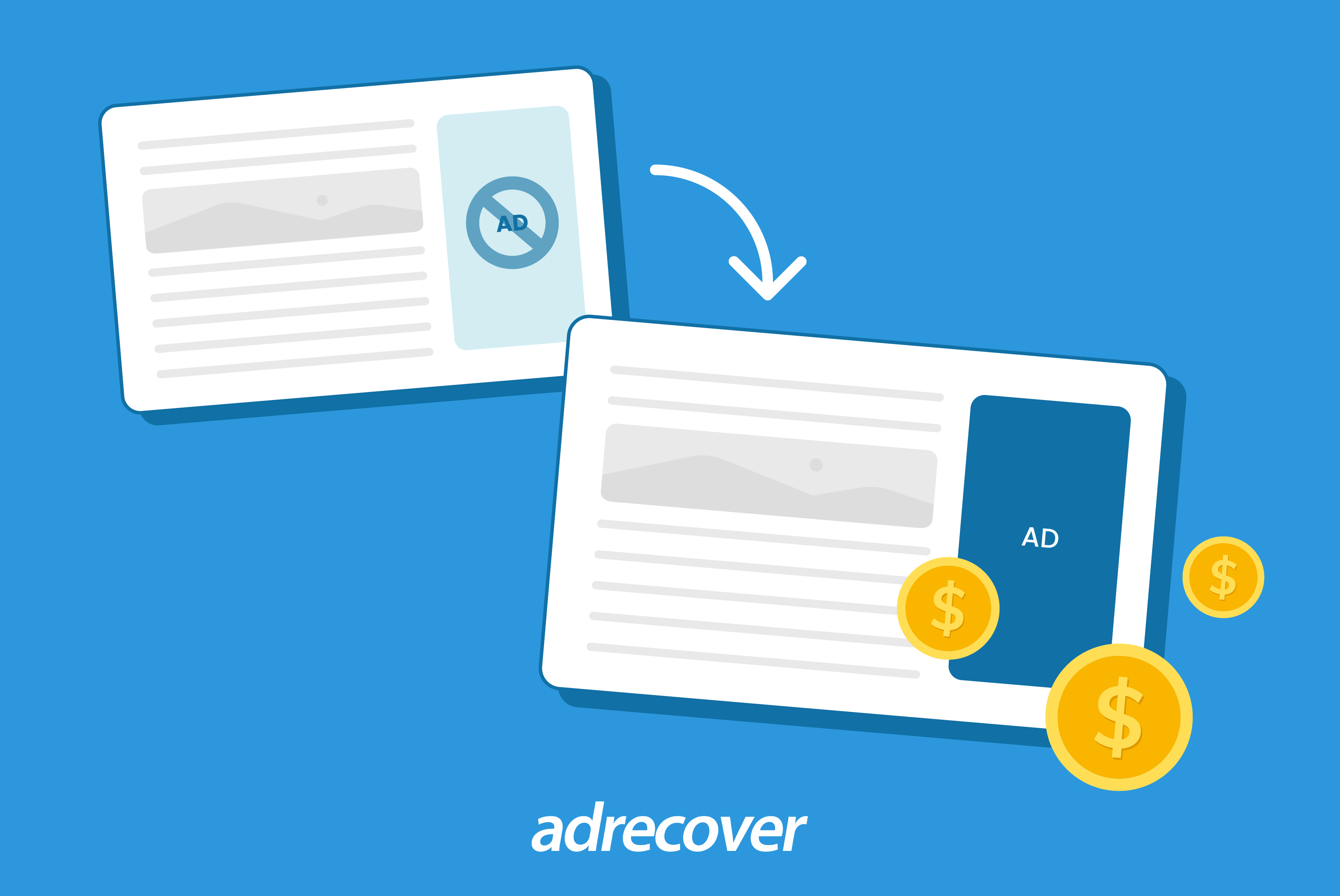Recent Blogs
Ad blocking is a quick and easy technique to remove intrusive adverts from your browser. Unfortunately, these advertisements slow down download times, clog up significant portions of websites, and could contain malware. So what exactly is ad blocking, and how does it operate then?
What Is Ad Blocking?
Any application (often a browser plug-in) that eliminates advertising content from websites, including intrusive ads, is known as an ad blocker.
The ad-blocking software examines the domain names of the elements loaded on the web page against extensive blocklists as the website loads.
The ad blocker prevents any website component identified as containing advertising from loading. Every media player in your browser will have ads blocked by an efficient ad blocker.
After the page’s content has been shown, the ad blocker scans the page for elements that adhere to specified criteria, such as images with standard banner dimensions, and removes those elements from view.
How Does Ad Blocking Work?
The functionality of an ad blocker depends on the software type. First, we will discuss some of the most popular ad-blocking programs and how they work.
- Browser Add-Ons
The most widely used kind of ad-blocking software is browser plug-ins. The ad blocker checks the site’s scripts and links during page loading against the list of things a plug-in intends to block.
Browser permissions constrain adblockers’ functionality in this situation.
- Separate App
Now that we’ve figured out the extension, how does ad blocking in a different app work?
The response is essentially the same. A standalone program uses the same filter criteria, but since the browser does not constrain its capability, it operates more efficiently and completely.
A system-wide ad blocker also prevents adverts from appearing in browsers, games, apps, etc.
- Built-in ad blockers for browsers (Opera, Brave)
What functions does ad block have when it is used in a browser? You might laugh, but that’s also true.
The advantage of built-in ad blockers over add-ons is that they speed up website loading by eliminating the need for additional browser operations to remove advertising.
Additionally, ad-blocking browsers typically eliminate more adverts than standard browsers and usually have fewer restrictions.
- VPNs/DNS
VPN/DNS ad filters halt requests to the ad servers. Software that blocks ads only through VPN/DNS filtering is less effective because it can’t handle native ads. This filtering type is covered in more detail later in the content.
Is Ad Blocking Safe?
Although ad blocking is typically secure, you should always pick a reputable ad-blocking program. You should also be aware that ad blockers are not a substitute for anti-malware software and do not offer complete malware and virus protection. Instead, they only conceal web ads from you.
Is Using An Ad Block Legal?
It is legitimate to ban adverts, yes. However, users have the freedom to choose how they wish to consume content, even while websites will specifically curate what they show or advertise to consumers. It just so happens that there are no adverts when using a website.
Why Do People Use Ad Blockers?
The benefit of blocking adverts is that it vastly enhances your browsing experience by eliminating invasive ads, video commercials, and heaps of irrelevant stuff. However, there are further advantages to putting in ad-blocking software:
- Security: Cybercriminals sometimes use online advertising to spread malware; therefore, by blocking them, you can prevent your device from becoming infected.
- Privacy: The program can also stop some third-party trackers from loading, so advertisers will no longer be able to gather data on your online activities. Even ad blockers can be used to prevent email tracking.
- Speed: Websites will load faster since they won’t need to pack several plug-ins, advertising tags, and third-party analytics. You might experience better performance if you block advertisements.
Ad Blocking’s Benefits And Drawbacks
Pros
- Ad Blocker ensures a better online experience.
Advertisers frequently discuss giving consumers the greatest experience possible. But by stuffing a webpage with a ton of pointless adverts, they deter visitors.
These advertisements only serve to hog wireless data and decrease download speeds. Your internet experience will improve now that you have an ad blocker installed.
- Ad Blocker addresses malware problems.
As many people are well aware, harmful malware can spread by delivering an advertisement to a computer system. In addition, hackers that alter adverts to propagate malware have entered marketing networks over time.
The attackers could harm a victim’s machines in minutes since the advertising was distributed through various websites. But you can avoid encountering this circumstance if you use an ad blocker.
- Ad Blocker keeps you from falling for dishonest marketing schemes.
Many advertisements result in loud volumes, dubious analytics, and false messages. These actions are taken solely to enhance particular advertising agencies’ online reputations. Fortunately for you, ad blocking will enable you to avoid these tricks.
- Advertisers are motivated by ad blockers to develop creative strategies for including advertisements on websites.
As a result of the restrictions that ad blocks impose on websites, advertisers will need to develop new strategies for using adverts online.
They ought to do it seamlessly to alleviate your worry about traditional ads that can ruin your online experience. For instance, they should attempt to meld advertising with the content naturally.
Cons
- Your privacy is at risk from ad blockers when you are online.
Some ad blockers transfer information about your browsing habits to a server in the cloud that receives payment.
This implies that they can monitor every page you visit. This technique is currently being used to track millions of users without awareness.
- Web sites crash while using an ad blocker.
Advertisement filters may interfere with a website’s page scripting and block the adverts on that page.
Its functionality will be compromised, some critical components will be corrupted, and you’ll have a poor surfing experience. In addition, there can be some missing sections or even an error message on the screen.
- Ad blockers mess up analytics on websites.
Some ad blockers can prevent analytics scripts from running, which makes it difficult for websites to gather information about visitor activity.
For instance, any site visitor with a script blocker enabled on their browser will not be counted in your stats. As a result, you will need to pay attention to crucial marketing information even though your site fully works for end customers.
- Ad-blocking software keeps you from enjoying good content.
For those who produce and publish online material, advertising is a crucial source of income. They employ it as compensation for the time they invest in creating high-quality material for you, the reader, and the end user.
Due to the financial impact of ad blockers, they will be forced to generate low-quality material since they lack the funds to do so.
- Your favorite websites are lost when you use an ad blocker.
When you access online content, you agree informally with the website’s owner to accept the advertisements supporting it.
The website would be compelled to shut down if these adverts were blocked. You would also lose a resource that you once frequently used as a result.
Here Are Some Reasons Why You May Want To Disable Your Ad Blocker
- You can finally read your favorite articles, view YouTube videos, and browse without distracting advertising when you have an ad blocker set on.
- Publishers are not compensated for ads that do not reach you, nevertheless. Because of this, some publications, regrettably, spend money on intrusive adverts.
- Advertisers only pay for advertising that is served, so occasionally, the content you are used to receiving for free is supported by advertisements.
- If you block advertisements, the website you love to read won’t be compensated if an advertisement doesn’t appear on your mobile or laptop screen due to your action.
- Publishers naturally make every effort to avoid ad blocking. Some create sponsored material, while others provide paid subscriptions, respectfully request that you whitelist their website, or temporarily turn off your ad blocker.
- Some websites even forbid readers from accessing their content if an ad blocker is activated. Unfortunately, blocking advertisements may harm some publishers.
- Although they can be invasive and irritating, advertisements are necessary for many of your favorite websites and online services.
- Although data on ad blockers demonstrate that they are typically worthwhile, you can also consider turning them off while visiting trustworthy websites you’d like to support.
- Even though they may bother you, obtrusive advertisements occasionally benefit your preferred publishers.
Where Ad-Blocking Software Is Ineffective
Ad-blocking software is not a certain kind of security and may not be effective in the following situations:
- Acceptable Ads: These are the advertising that has received the Acceptable Ads Committee’s seal of approval and are discrete, respectful, and identified as such.
- As mentioned above, websites that make money from advertisements may require you to disable ad-blocking software because these adverts are typically not bothersome.
- Certain websites (such as Facebook, YouTube, or Twitch) employ unique methods to get around ad blockers. So even if ad-blockers continuously combat them with new upgrades, you could nevertheless frequently see advertising on social networking networks.
- Ad content. Some advertisements are linked to the media you watch. For example, this might be a video in which the speaker promotes a product or an article recommending specific products.
It is possible to prevent this kind of advertising by blocking all information.
How To Choose Ad Block Software?
Consider the following factors when picking the best ad-blocking software/browser extension because there are so many options available:
- Preventing ad-blocker fraud. Always do your research before using an app. Fake ad-blocking software may not work properly and may infect you with malware or collect your data from outside parties.
- Different kinds of advertisements were restricted. Make sure an ad blocker prevents various adverts, such as pop-ups, banners, and video commercials.
- Functionality and potential for customization. Make sure an ad-blocker has enough customization options so that you can quickly allow a particular type of ad to access certain pages, use filters, etc.
- Customer service. This is crucial in case you run into any issues.
- Some ad filters can be too aggressive and prevent access to pertinent material.
The Conclusion
The world of digital advertising is currently undergoing enormous transformation. Because ad blocking has lessened the impact of online ads, the internet advertising sector and the newspapers that depend on it for income are at a turning point.
However, most of their injuries are self-inflicted: the mediocre online advertising directly contributed to the rapid uptake of ad-blocking software. The future of the advertising sector and the online browsing experience for everyone will be shaped by how marketers respond to ad blockers.
Our survey reveals that many consumers worldwide are prepared to view adverts if advertisers agree to limit their use to hidden ones. Consumer behavior ought to guide decision-making. Understanding what gives consumers value should constitute the first step in the evolution of the advertising industry.




Let's Connect